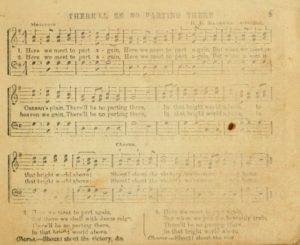Christian Hymns

Hymn Culture
The singing of hymns is a regular refrain in Du Vernet’s diary. This was not unusual: in the nineteenth century, hymn singing played a central part of Anglican devotional life, and in the lives of most Protestant Christians.
Hymns were a part of formal worship during Sunday services, but people also sung hymns at home. In 1898, many Anglicans would know by heart the words and tunes of many hymns, but they could also turn to books, including the Church Hymnal, published in 1886 with over 500 hymns.
In his diary, Du Vernet mentions singing many hymns by name, including “Alas and Did My Savior Bleed,” “Onward Christian Soldiers,” “There’ll be No Parting There,” “Nearer my God to Thee,” “Only Trust Him,” “Oh God Come and Take Me,” and “Jesus Bids Us Shine.”
Musical Invasion
One of his most interesting descriptions of hymn-singing occurs in his recounting of an interaction between Jeremiah Johnston and Tom Overcome, in which Jeremiah tried to resist the pressure of the visiting Archbishop Phair to sing a hymn when visiting Tom, who was not Christian. According to Du Vernet, “Mr. J. did not like to do this as it was not his custom to sing unless he knew the Indians wished it.”
Du Vernet knew the joy of singing hymns, but learned from Johnston that they could also be a musical form of invasion.